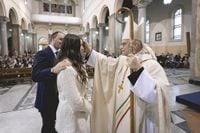SOAVE, Italy (AP) — The election of Cardinal Robert Francis Prevost as the 267th pope of the Roman Catholic Church, now known as Pope Leo XIV, has sparked excitement and curiosity, especially among the students at Marymount International School in Rome. On May 11, 2024, Cardinal Prevost confirmed a group of ninth graders during a Mass, an event that took on new significance following his election on May 10, 2025. Sarah Gallagher, the school head, shared that the students were "absolutely elated" upon learning about their former cardinal's ascension to the papacy.
Marymount, a Catholic school with American ties, has a tradition of having an American cardinal confirm its students. Cardinal Prevost, relatively new to Rome after being appointed by Pope Francis to the curia, was chosen for this role last year. Gallagher recalled sharing dinner with him, noting that he was "a very quiet, unassuming sort of person" who didn’t seem like a potential papal candidate at the time. Each of the more than 30 students had penned letters to Cardinal Prevost prior to their confirmation, and Gallagher highlighted how beautifully he maintained a sense of intimacy during the ceremony, creating "a lovely peace at the time" with his gentleness.
During his first formal audience on May 10, 2025, Pope Leo XIV articulated his vision for the papacy, identifying artificial intelligence (AI) as a pressing challenge for humanity. In his address, he emphasized the need for the Catholic Church to navigate the complexities posed by AI while upholding human dignity and justice. This focus on AI aligns with concerns raised by his predecessor, Pope Francis, who passed away on April 21, 2025, and had increasingly warned about the ethical implications of AI technology.
Pope Leo XIV's first public appearance as pope took him to a sanctuary south of Rome, dedicated to the Virgin Mary, where he greeted townspeople and offered blessings. This sanctuary, a site of pilgrimage since the 15th century, was elevated to a minor basilica by Pope Leo XIII in the early 1900s. The new pope’s commitment to the reforms established during the Second Vatican Council was clear, as he sought to continue the mission of inclusivity and compassion championed by Pope Francis.
As the first American-born pope, Leo XIV faces a packed schedule of religious services and diplomatic meetings, including the upcoming formal inauguration Mass in St. Peter's Square on May 18, 2025. He will also preside over events for the 2025 Holy Year, a significant Jubilee that draws millions of pilgrims to Rome every 25 years. These responsibilities were inherited from Pope Francis, whose death has left a profound impact on the Catholic community.
German Cardinal Reinhard Marx has praised Pope Leo XIV's extensive experience and cultural knowledge, highlighting his dual citizenship and fluency in multiple languages, including English, Spanish, French, Italian, and German. Cardinal Marx stated, "He spoke his first word on peace. I think that was an important word, which he made clear once again," suggesting that Leo XIV would continue to advocate against conflict and violence.
While President Donald Trump has welcomed the election of the first U.S. pope, some observers note that Leo XIV previously challenged U.S. policies on migration during his time as a cardinal. Cardinal Marx indicated that while Leo might navigate relations with the Trump administration carefully, he would not shy away from taking a stand when necessary.
Rev. Joseph Farrell, Vicar General of the Order of St. Augustine, remarked that Pope Leo XIV is likely to be more measured in his approach compared to his predecessor, who was known for his spontaneous remarks. Farrell noted, "I think what we'll see with Pope Leo is a man who wants to think first and process what is the message he wants to deliver. And then deliver it," which he believes is a valuable trait for a leader in the church.
The choice of the name Leo carries historical significance, as it reflects the legacy of Pope Leo XIII, who was known for advocating workers' rights and addressing social justice issues through his 1891 encyclical, Rerum Novarum. This connection suggests that Pope Leo XIV may prioritize social issues, including labor rights, in his papacy.
In a speech from 2012 at the Synod of Bishops, Leo XIV previously criticized the portrayal of anti-Christian lifestyles in media, citing it as a challenge for the Church. However, in September 2023, he acknowledged a shift in perspective, stating that the Church must be more welcoming and open to all individuals, regardless of their lifestyle choices. He emphasized the importance of inviting people to rediscover their faith and relationship with God, suggesting a more inclusive approach under his leadership.
Reflecting on the teachings of St. Augustine, Leo XIV highlighted the significance of finding God in solidarity with others, countering the individualism prevalent in modern society. He believes that authentic happiness involves caring for others and fostering community, a message that resonates deeply with the core values of the Gospel.
As Pope Leo XIV embarks on his papacy, the world watches closely to see how he will blend tradition with contemporary challenges, particularly in the realm of technology and social justice. His leadership style, shaped by his experiences and insights, promises to bring a thoughtful and compassionate approach to the Catholic Church's mission in the 21st century.

